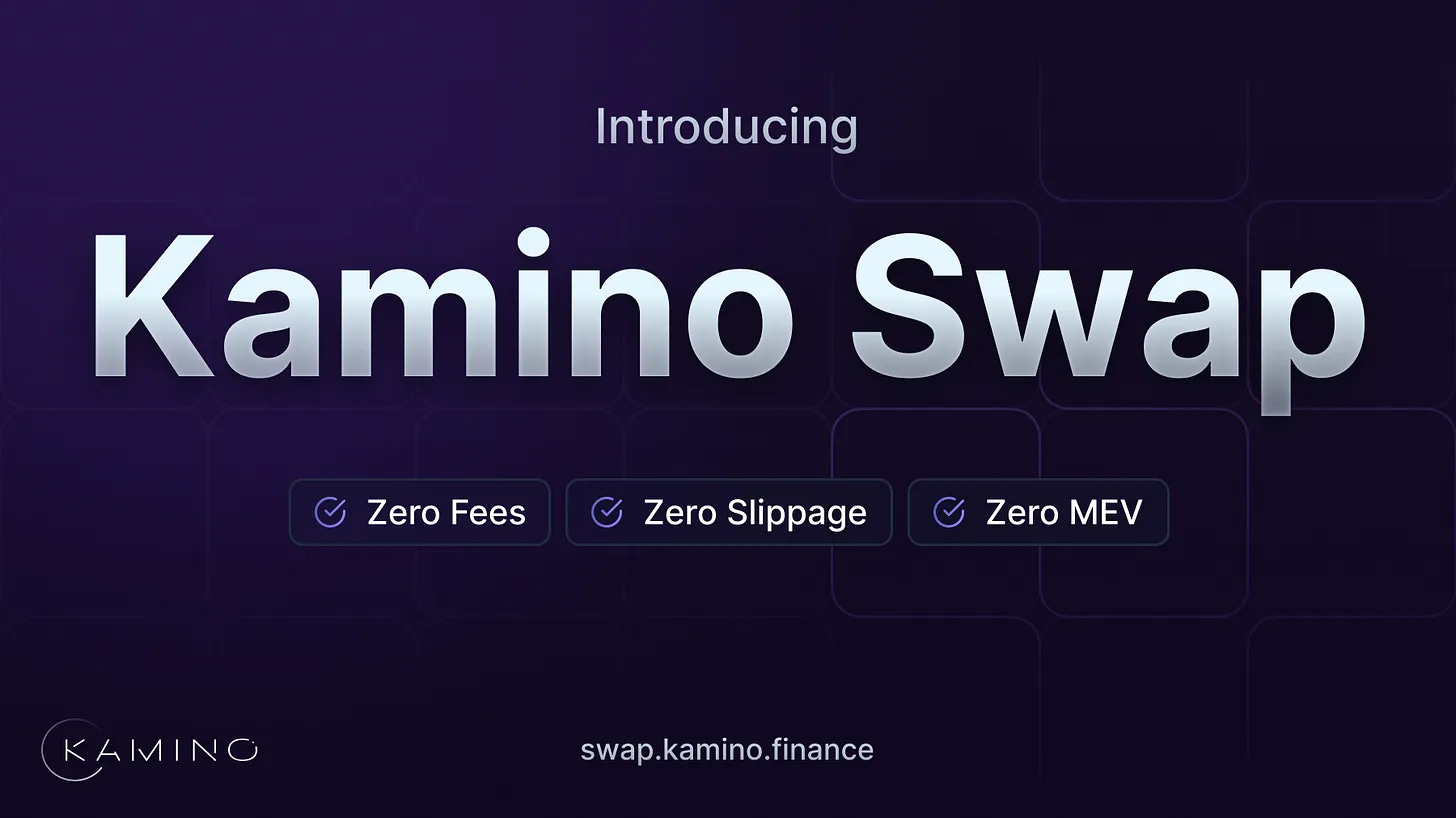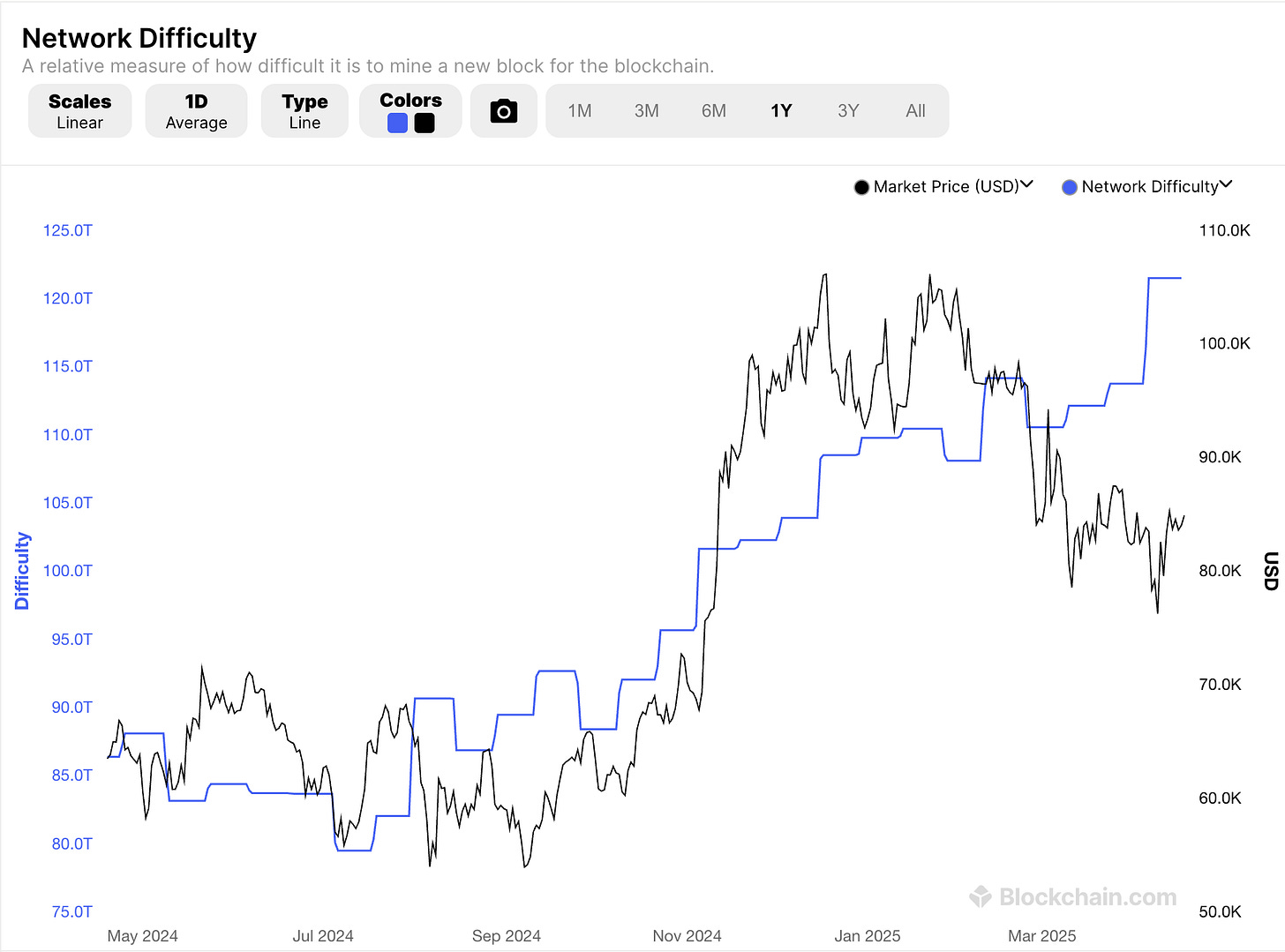Hello, y'all. Happy Saturday.
On-chain data platform CryptoQuant reported on Tuesday that miners sold 15,000 BTC ($1.12 billion) in a single day on April 7, when the Bitcoin price had slumped below $75,000. That was the third-largest daily outflow this year.
Last month, public miners sold four in every 10 Bitcoin they had mined, the largest monthly sell-off since October 2024.
The reason? Bitcoin mining has never been harder. Even literally. Network difficulty just hit an all-time high while hashprice has plummeted since January.
And that’s just one part of the worry for the miners.
In today's Wormhole, we tell you
why Bitcoin miners are struggling to stay afloat
how trade tariffs might trigger the biggest mining migration since 2021
what’s driving miners to consider selling Bitcoin during the dip and
what this means for the future of Bitcoin network
Earn, Swap, Borrow - All at One Place!
“Wait, so I don’t need three tabs open just to trade tokens?”
Exactly. Kamino just made swapping crypto super simple.
You open the app, pick what you want to swap, and done. No bouncing between platforms, no weird buttons, no wondering if you did it right.
It’s like if your wallet, trading app, and DeFi dashboard all got together and said: “Let’s make this make sense.”
Why’s this a big deal?
You can swap tokens without leaving Kamino
No shady popups or confusing steps
It’s fast (like, Solana-fast)
It’s built for people who don’t live on Crypto Twitter
Just clear, easy swaps that work - check it out.
The Treble Trouble
Bitcoin miners are facing a convergence of pressures that's testing even the most well-capitalised operations.
1/ Difficulty surge meets price slump: Network difficulty has hit an all-time high. Meaning? Miners have to work harder and employ more computing resources than ever for the same rewards.
This coincides with a 30% Bitcoin price slump from its January 20 inauguration-day high of $108,786. The combination has devastated operating margins, which CryptoQuant reports have collapsed from 53% in late January to just 33% today.
2/ Trump's tariffs shake equipment markets: US President Donald Trump’s policies have increased mining equipment costs, with Chinese imports facing tariffs as high as 131%.
This dramatic cost inflation puts US miners at a severe competitive disadvantage against international operations that can access the same equipment without these additional burdens.
"If you're paying more for a machine than your competitor in Canada or Russia, it's going to be hard to compete," Bitcoin mining pool Luxor Technology's Ethan Vera said in an interview with the Mining Pod.
3/ The halving event of 2024 still casts dark shadows: A full year after the April 2024 halving slashed block rewards from 6.25 to 3.125 BTC, miners continue to feel the pain. Mining revenues and gross profits have dropped by an average of 46% and 57% respectively since the event, JPMorgan told Cointelegraph.
Last month was the worst performing for miners in terms of revenue since February 2023.
Get 17% discount on our annual plans and access our weekly premium features (Mempool, Game On, News Rollups, HashedIn, Wormhole and Rabbit hole) and subscribers-only posts. Also, show us some love on Twitter and Telegram.
The Trump Paradox
The irony facing the miners is that one of their most-trusted friends at the start of the year has now turned foe. Trump positioned himself as crypto's saviour during his campaign, promising that "all remaining Bitcoin to be made in the USA." His election sparked a rally that pushed Bitcoin to nearly $109,000.
Yet, his administration's tariff policies are now devastating the very industry he championed. By imposing sweeping tariffs on almost every country — with particularly harsh measures against China — Trump has made it prohibitively expensive to import the specialised ASIC miners that power the Bitcoin network.
Not just China, other countries where the US miners sourced their mining equipment from were also not spared from tariffs, Jaran Mellerud from Hashlabs, a bitcoin mining company, wrote in his report.
Indonesia: 32% tax (up from 2%)
Malaysia: 24% tax (up from 2%)
Thailand: 36% tax (up from 2%)
This price differential in an industry with razor-thin margins could be catastrophic.
The situation becomes even more ironic considering the Trump family's own business interests. Donald Trump Jr and Eric Trump recently partnered with Hut 8 to launch "American Bitcoin", a venture aiming to become "the world's largest, most efficient pure-play Bitcoin miner."
Read: Trump family investing in bitcoin mining venture
Got questions about a hot crypto topic that you want help understanding? Ask your question using the form and our crypto experts may answer it along with your name in our weekly News Rollups.
Survival Strategies
Miners are adopting diverse — and sometimes contradictory — strategies to stay afloat in these conditions.
The Sellers: Bitcoin miners stacked the sats they mined through most parts of 2023-24, until the start of 2025. For the past three months, the miners reversed course and sold more than 40% of their production.
CleanSpark, which previously held 100% of mined BTC, announced a new "balanced approach" and secured a $200 million credit line from Coinbase Prime to avoid equity dilution.
The Manufacturers: Bitdeer said it would pivot to US-based manufacturing and prioritising self-mining amid adverse tariff conditions. "We want to bring jobs and manufacturing back to America," explained Jeff LaBerge, Bitdeer's head of capital markets.
The Diversifiers: Companies like Bit Digital are expanding beyond crypto into artificial intelligence and high-performance computing for better revenues and margins. Just this week, Bit Digital acquired a $53.2 million facility in North Carolina and announced a new Tier 3 data centre in Quebec to support AI infrastructure.
Early results suggest diverging outcomes for these strategies.
In the first two weeks of April, pure-play miners like MARA Holdings and CleanSpark outperformed Bitcoin, JPMorgan said in its report. Those with high-performance computing exposure, including Bitdeer, TeraWulf, IREN, and Riot Platforms, underperformed.
The Global Reshuffling
The US currently dominates global Bitcoin mining with about 40% of the network's hashrate. Industry experts believe Trump's tariffs could trigger a reshuffling comparable to China's 2021 mining ban.
"In terms of the scale of geopolitical impact, it's probably relevant to think about this as being on par with the China ban," says Luxor's Vera.
Mellerud paints an even more dramatic picture.
This could accelerate hashrate growth in already established mining hubs like Russia (currently at 16% of global hashrate), Ethiopia, and the Nordic countries, while potentially giving rise to new players in energy-rich regions of the Southern Hemisphere.
The situation is further complicated by the Clean Cloud Act, introduced by Democratic Senators Sheldon Whitehouse and John Fetterman.
Read: Clean Cloud Act Raises Crypto's Carbon Footprint 👣
This legislation would impose a carbon intensity fee starting in 2026 for mining operations that exceed regional emissions baselines — thresholds that would decline by 11% annually until reaching zero in 2035.
This creates an impossible triangle: Trump wants US mining dominance, Democrats want clean energy, and miners need profitability — all this while the tariffs threaten to spoil the game.
Token Dispatch View 🔍
One shouldn’t think of the Bitcoin mining crisis as another bump on the road to adoption. This situation is exposing fundamental contradictions at the heart of the industry and the cryptocurrency itself.
First is the political contradiction. Trump’s inconsistent policies throw light on a clash between nationalism and the inherently global nature of Bitcoin. The desire to bring "all remaining Bitcoin" under American control fundamentally misunderstands what made Bitcoin revolutionary in the first place: its borderless, jurisdiction-resistant nature.
Second is the economic contradiction. Miners are simultaneously the security backbone of Bitcoin and its weakest economic link. Their business model relies on ever-increasing Bitcoin prices outpacing the difficulty adjustment and halving schedules. This is a precarious equation in the best of circumstances, now exacerbated by government-induced trade barriers.
The third contradiction is philosophical. Jack Dorsey and Michael Saylor's debate about Bitcoin's purpose — payment network versus store of value — is playing out in miners' actions. When miners liquidate huge portions of their production to survive, they're implicitly acknowledging that Bitcoin's current value proposition is insufficient to sustain its own security infrastructure.
Some part of these contradictions show how Bitcoin was always expected to have these intrinsically. Miners’ current situation is just showing us that what was once expected to happen in future is now here and a reality.
The network needs miners for security, but miners increasingly need diversification beyond Bitcoin to survive. Bitcoin needs global distribution for resilience, but political forces push for national concentration. Bitcoin needs transaction volume for fee revenue, but users primarily treat it as a holding asset.
The resolution of these contradictions will define Bitcoin's next evolution. Miners could consider consolidating into mega-operations with diversified revenue streams, creating a more centralised but financially stable security layer.
Bitcoin could also become more geographically distributed as non-US operations gain competitive advantage. Or perhaps fee economics will force a reckoning with Bitcoin's payment utility.
Whatever emerges, one thing is clear: the mining industry that survives this crisis won't be the one that entered it. And the Bitcoin network secured by those survivors will be fundamentally transformed as well.
Token Dispatch is a daily crypto newsletter handpicked and crafted with love by human bots. You can find all about us here 🙌
If you want to reach out to 200,000+ subscriber community of the Token Dispatch, you can explore the partnership opportunities with us.
Fill out this form to submit your details and book a meeting with us directly.
Disclaimer: This newsletter contains sponsored content and affiliate links. All sponsored content is clearly marked. Opinions expressed by sponsors or in sponsored content are their own and do not necessarily reflect the views of this newsletter or its authors. We may receive compensation from featured products/services. Content is for informational purposes only, not financial advice. Trading crypto involves substantial risk - your capital is at risk. Do your own research.













